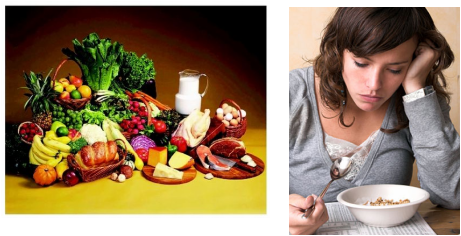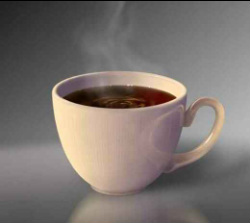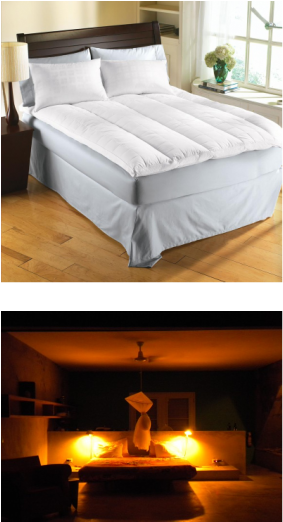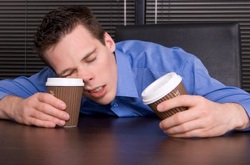Treatment/Coping Sleep Deprivation
Foods/Drinks Aiding Sleep

When getting the amount of sleep is difficult to accomplish, the food that is consumed might alleviate this problem. Based on scientific research, foods that are high in the amino acid tryptophan could restore the essential amount of repose as they cause sleepiness. This means that tryptophan has been found to better improve one’s ability to fall asleep. According to the National Sleep Foundation (2010), carbohydrates make tryptophan more available to the brain, which is why carbohydrate-heavy meals can make you drowsy. Proteins from the food we eat are the building blocks of tryptophan, which is why the best bedtime snack is one that contains both a carbohydrate and protein, such as cereal with milk, peanut butter on toast, or cheese and crackers (National Sleep Foundation, 2010). These foods could help the quality of sleep in others especially for teenagers.
Foods/Drinks to Avoid...

There are foods to aid sleep deprivation but there are also foods that should be avoided to relieve this obstruction. According to the CDC Office of Women’s Health (2009), avoid stimulants like caffeine and nicotine as the stimulating effects of caffeine in coffee, colas, teas, and chocolate, that can take as long as eight hours to wear off fully. As a stimulant, caffeine speeds up the action of not only the nervous system, but other major body systems, too. If one has the urgency to attain and consume caffeine or other aids to “get going”, it is most likely a person not getting the right amount of hours of sleep every night.
Other Alternatives and Recommendations...

If food consumption does not work, there are many other ways people can attain a good night sleep. According to National Sleep Foundation (2010), Melatonin is a naturally occurring hormone that regulates sleepiness as it is made in the brain by converting tryptophan first to serotonin and then to melatonin, which is secreted at night by the pineal gland in the brain to induce and maintain sleep. Though there is scientific evidence that shows little or no benefits of melatonin in improving sleep, they are still widely used as sleep aids (National Sleep Foundation, 2010). Health Grades Inc. (2010) suggests that you should always seek professional medical advice about any treatment or change in treatment plans. As for treatment options, physicians also propose a hot bath, a good pillow, aromatherapy and/ or the usage of prescription and over-the-counter sleep medications – which often contains antihistamines to help treat sleep deprivation (Health Grades Inc., 2010). Exercising or taking a warm bath 3-5 hours before bedtime helps people fall asleep because these actions raises the body temperature (C. Yoshimura, personal communication, November 3, 2010). C. Yoshimura (personal communication, November 3, 2010) includes that the resulting fall in body temperature several hours later from exercising makes falling asleep easier.
There are many other alternatives to help cope with a lack of sleep. Attaining and maintaining a better sleep pattern will help minimize sleep deprivation. According to Help Guides (2010), keeping a regular sleep schedule will help solve the problem. Attaining a regular sleep schedule includes setting a regular bedtime for one’s self every night, waking up the same time every day, and napping at appropriate times throughout the day to makes up for lost sleep (Help Guides, 2010). Help Guides (2010) has also advised to create a relaxing bedtime routine by keeping noise levels to a minimum, keeping your room dark and cool, making sure one’s bed is comfortable, and turning off any distractions such as the television and computers. A maintained sleeping schedule and environment will surely help a person from sleep deprivation.

Respiratory Therapist, C. Yoshimura (personal communication, November 3, 2010) shared guided information for improving sleep habits from the National Sleep Foundation. These recommendations include: maintaining a regular bed and wake time schedule including weekends, establish a regular, relaxing bedtime routine such as soaking in a hot bath or hot tub and then reading a book or listening to soothing music, sleeping on a comfortable mattress and pillows, finishing a meal at least two to three hours before your regular bedtime and avoid caffeine a close to before bedtime. If one would attain like to attain a better night’s sleep in the future due to sleep deprivation, these recommendations are strongly advised.
For more information on recommendations to cope/deal with sleep deprivation...
National Sleep Foundation: http://www.sleepfoundation.org/article/sleep-topics/food-and-sleepweeblylink_new_window
Health Grades Inc.: http://www.wrongdiagnosis.com/s/sleep_deprivation/treatments.htmweeblylink_new_window
CDC Office of Women’s Health:
Health Grades Inc.: http://www.wrongdiagnosis.com/s/sleep_deprivation/treatments.htmweeblylink_new_window
CDC Office of Women’s Health:
Picture References:
http://www.eatindianfood.com/images/Eating-daily-Breakfast,-Salad,-Snacks,-Fried-snacks,-Sweet-meats-foods-opt.jpg
http://www.brookstone.com/catalogimageservlet?productId=6803713&languageId=EN&image&imageVer=1
http://www.blogcdn.com/www.luxist.com/media/2010/02/dscn5968.jpg
http://images.agoramedia.com/everydayhealth/gcms/photogallery_finding_foods_to_help_you_sleep_better_02_full.jpg
http://malaysia-tomorrow.com/wp-content/uploads/2008/12/sleep-deprived.jpg
http://www.eatindianfood.com/images/Eating-daily-Breakfast,-Salad,-Snacks,-Fried-snacks,-Sweet-meats-foods-opt.jpg
http://www.brookstone.com/catalogimageservlet?productId=6803713&languageId=EN&image&imageVer=1
http://www.blogcdn.com/www.luxist.com/media/2010/02/dscn5968.jpg
http://images.agoramedia.com/everydayhealth/gcms/photogallery_finding_foods_to_help_you_sleep_better_02_full.jpg
http://malaysia-tomorrow.com/wp-content/uploads/2008/12/sleep-deprived.jpg
